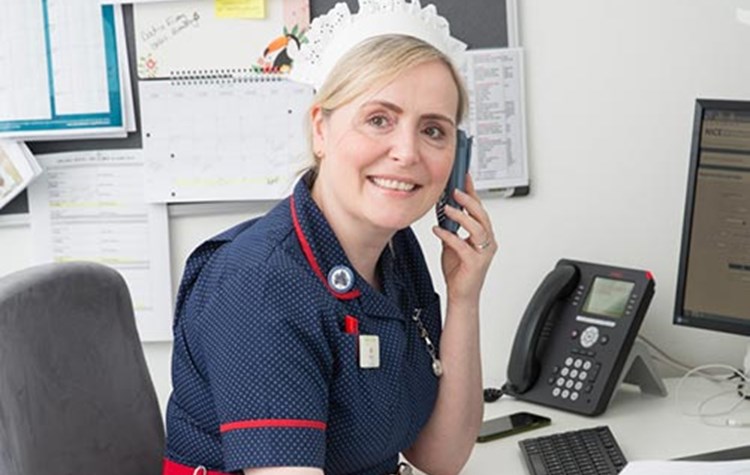Published on 10 May 2021
Ali Turner began her full-time career at Benenden Hospital in 2001 and progressed to the role of Matron – a role she has held since 2013. Here, in the second of series of conversation pieces (read Part 1), Ali talks about how, after completing her studies, she considered the nursing options available to her and ultimately plumped for the job offer that came to her from our hospital.
"After my training I spent about six months working in A&E while I considered my options. I’d had some amazing experiences during my training and really loved all my placements, so deciding where to go first was quite tough.
"I was torn between surgery and the acute setting really, and it just so happened that Benenden Hospital (where I’d been for one of my placements) came back to me first with the offer of a job. Given I had thoroughly enjoyed my placement I jumped at the chance to join the hospital on a permanent basis.
"Benenden Hospital felt completely different in some ways – the uniforms for a start! I hadn’t seen a nurse wearing a hat until I came here as these had been phased out in the NHS before I started my training. I wouldn’t call it old-fashioned, more like traditional in some of the customs and ways. It did though reflect perfectly, the high standards of the hospital.
"I remember hearing a lot when I first joined about the ‘Benenden way’ of doing things. Wrapped up in that is its fabulous history of innovation, development, creativity, boldness, and continuous improvement which is incredibly special.
"I started out on the women’s surgical ward which, back then, was a 26-bedded ward looking after patients who had come in for a variety of gynaecology, urology, and general surgery procedures. It was a fantastic proving ground as I got to work with some superb nurses who really taught me a lot.
"To get my next grade, I moved to the short-stay ward and had to demonstrate my management capabilities around patient dependencies, staffing etc, so under the watchful eye of the senior sister, I was able to achieve that.
"My next move was to the High Dependency Unit (HDU), and this was where I developed an interest in pain management. After initially working alongside the pain management specialist nurse, who was a fantastic mentor, I later had the opportunity to apply for that post when it became vacant.
"So, I was now splitting my time between HDU and pain management and this continued for around two years or so and it was then that another opportunity came along for a Preoperative Assessment Co-ordinator. The hospital was looking for someone to re-design and improve its preoperative services, so I threw my hat in the ring for that job and I was delighted to be offered the post. After about 18 months, I found that the preoperative role really needed all my time and thankfully, the hospital was very supportive of my moving into that role full-time.
"Pain management was my first real ‘specialist interest’. I worked with some fantastic anaesthetists, and one in particular who really must have seen something in me, along with Jane Abbott, our current Chief Nurse and Hospital Director.
"Jane and I started at the hospital within a year of each other and she really did encourage me, giving me a positive shove in the right direction, at exactly the right time!
"Encouraged by her to “go for it”, I saw this as a development opportunity and so I took up my first specialist post of pain management nurse. This meant I not only developed my knowledge base further, including completing a post-registration degree in the subject, but also increased my exposure to other elements and areas of the hospital. I started working with other clinicians and in other departments (outpatients, theatres, recovery, High Dependency Unit and in day surgery), which meant I was able to learn so much more about how areas within the hospital co-exist, depend on each other, and collaborate.
"Farther on, as I say, an opportunity then presented itself for me to set up a new preoperative assessment service for the hospital, which was as an emerging discipline within nursing at that time. I was in that role for the next six years.
"A move to Outpatients and management soon followed, which meant I took on the overall management of outpatient clinics (medicine and surgery), endoscopy, minor operations, preoperative assessment, ambulatory day surgery (which was eyes, feet, hernia, hands, veins) and the Continence Care team.
"This was my first real foray into managing multiple areas/disciplines and teams and the experience was really invaluable for when I then applied for the Matron’s post in 2013.
"When that role became available and I applied for it, I was under no illusions that the role would be easy; the Matron role is as important now as it’s ever been. Today’s Matron needs to have that ability to care coupled with commercial acumen and be able to lead on standards of care and quality as well as to actively contribute to the business’s continuous improvement."
In the final part of our conversation, Ali talks about the role of Matron in a busy private hospital - including ensuring that our patients have the best experience they can.
Careers in nursing
If you’re interested in a career in nursing, help and information can be found below, or visit our careers in nursing page.






